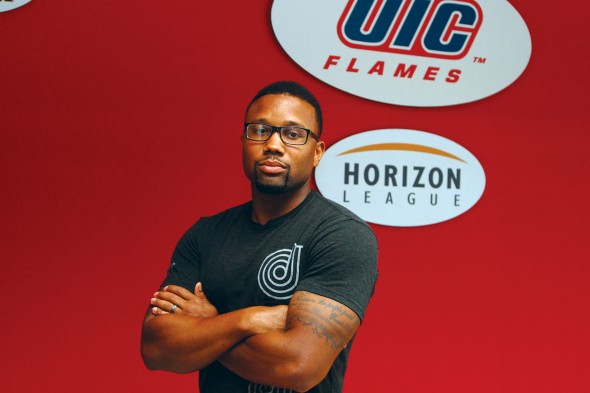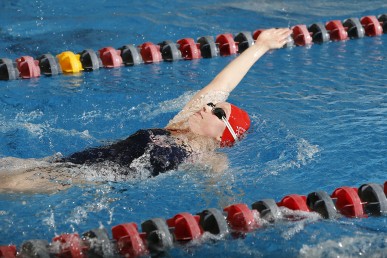East Meets West: Why are athletes strong and fast?

Doctoral student Jarrad Hampton-Marcell is collaborating with UIC researchers to determine how gut bacteria affects athleticism. — Photo: Jenny Fontaine
What role does gut bacteria play in making athletes strong and fast?
UIC doctoral student Jarrad Hampton-Marcell will use a $100,000 citizen-science grant from uBiome, a microbial genomics company, to examine that question. Hampton-Marcell was selected for the grant by a public vote during the uBiome Microbiome Research Grant Competition.
Hampton-Marcell, a biological sciences student, is studying whether changes in gut microbial communities can help measure the impact of athletic training regimens.
“This grant will allow me to find the biological signatures that could potentially contribute to better understanding of metabolism, inflammation and energy utilization driven by the gut microbiome and begin to understand how to create individualized and affordable treatments based on one’s lifestyle,” said Hampton-Marcell, who also works as a microbiologist at Argonne National Laboratory.

A pilot study was conducted with help from the UIC swim team, but Hampton-Marcell plans to use his $100,000 grant to expand his research to include all UIC athletes. — Photo: Steve Woltmann
He’s collaborating on his multidisciplinary project with UIC researchers from the east and west sides of campus. Rachel Poretsky, assistant professor of biological sciences, will use her expertise in microbial ecology and bioinformatics to help identify the microorganisms that influence metabolism, inflammation and development or degradation. Craig Horswill, adjunct clinical associate professor of kinesiology and nutrition, will bring his exercise physiology background to the project, helping Hampton-Marcell understand how hydration influences energy utilization in relation to performance.
“They have been integral in helping me develop my research as it crosses both disciplines,” Hampton-Marcell said.
Athletes serve as an “elevated model” in studying biological systems because of their regimented exercise programs and healthy, monitored diet, Hampton-Marcell said. He’s working with the UIC swim team on his study and plans to use the grant to expand his research to include all UIC athletes.
Conducting the study on athletes reduced the variability that comes with human subjects, he said.
“Athletes are undergoing the same lifestyle regimes,” he said. “If you are looking at two people with a similar disease and they have different lifestyle traits — like smoking or using alcohol — you can draw very different conclusions.”
Hampton-Marcell himself is an athlete — he spent a year on the Fighting Illini football team on the Urbana campus as a walk-on player. He received his bachelor’s in molecular and cellular biology and master’s in integrative biology from the Urbana campus.
His study could also have larger implications beyond athletes, Hampton-Marcell said.
“The overall goal is understanding central fatigue theory, which implies the body shuts down when it no longer can keep up with demands,” he said. “This theory has a number of ambiguities on the cause, so I’m hoping the microbiome can provide clues to the initial steps of this cascade. If we can figure this out, it will have impact on a number of different fields outside of athletes.”
